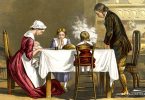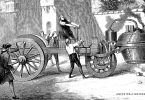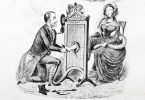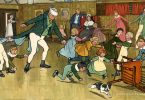The decade after the American Civil War was one in which a lot of things were going on in the world. Not only was the United States moving past the Civil War and the changes in American society the freeing of the slaves meant, but empires and imperialism were on the rise in Europe and Asia. Germany became one unified country in 1871. The rise of labor unions around the world meant a lot of worker strikes occurred, and this is a trend that continued until WWI. New inventions began to change the world from a primitive and agrarian one to a more modern and technologically dependent one. Here are some of the things your ancestors may have enjoyed or celebrated in the 1870s.
The Telephone
The prototype of the first telephone was invented in 1876 by Alexander Graham Bell. Its popularity and public usefulness quickly took off, and telephones were common in public buildings, and even some private homes, by the next decade. This invention spawned the entire telecom industry, with all the new jobs it brought with it. Not only that, it revolutionized the way people communicated with each other over long distances.
The Light Bulb
Thomas Edison produced his first version of the light bulb in 1879. Once electricity began to be a common thing to be found in public and private buildings in the next decade, light bulbs were the most commonly used electric item for decades after that. Edison brought reliable and safe indoor lighting to everyone. It changed the world forever, for the better.
The Natural World
The Atlas bear became extinct in this decade. It was also the same decade that the United States established Yellowstone National Park, which, ironically, served as a place to protect other bears on the continent. It was also the start of the national parks movement, which has created many protected and unbelievably gorgeous natural places for people to enjoy today.
Culture
Culture took several important steps forward during this decade. The novel, Around the World in Eighty Days, by Jules Verne, was published during this decade. Lewis Carroll published Through the Looking Glass, introducing us all to Alice and her adventures in Wonderland. Henrik Ibsen published A Doll’s House in the 1870s, too.
The Impressionist movement began among painters. There are many well-known Impressionist paintings from this period in museums and private collections today. Several well-known artists also got together and formed the Cooperative and Anonymous Association of Painters, Sculptors, and Engravers. The purpose of this group was to exhibit their work independently, instead of through the Salon, which was the primary venue for exhibiting artwork at that time. Artists who founded and/or joined the group include Monet, Pissarro, Renoir, Sisley, Cezanne, Morisot, Berthe, Boudin, and Degas. The first exhibition put on by this group included thirty artists, and changed the way art was exhibited to the public.






